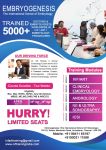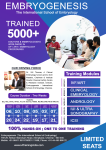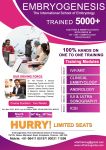
IVF NewsNews: ART & Embryology training program
Chennai Fertility Center and Research Institute 03 March 2023

April 2023 Training Batch Schedule - 10th Apr - 24th Apr 2023. The International School of Embryology was established to offer training for clinicians in advanced reproductive technologies. Our skill and precision to all aspirants help them to know in-depth knowledge and experience. The members of our teaching faculty aim to bring doctors and embryologists to the highest level of knowledge about reproductive techniques and practical capability in the field. Our courses cover basics in Andrology, embryology, ICSI, and cryosciences (Hands-on). Limited Seats. For admission Contact 9003111598 / 8428278218 (Whats app) [ Full Article ] Announcement: Hands-on Training on Simulators: OPU & ET
Dr. Sarabpreet Singh 27 February 2023

The Fertilis Academy and Sadbhawna IVF School have announced a 2-day course focusing on the "Hands-on Training on Simulators: OPU & ET". Beginning on 2nd March 2023 from 9 AM IST onwards. [ Full Article ] News: ART & Embryology training program
Chennai Fertility Center and Research Institute 23 February 2023

2023 Training Batch Schedule's -
The International School of Embryology was established to offer training for clinicians in advanced reproductive technologies. Our skill and precision to all aspirants help them to know in-depth knowledge and experience. The members of our teaching faculty aim to bring doctors and embryologists to the highest level of knowledge about reproductive techniques and practical capability in the field. Our courses cover basics in Andrology, embryology, ICSI, and cryosciences (Hands-on). Limited Seats. For admission Contact 9003111598 / 8428278218. [ Full Article ] News: IVF does not impact cardiometabolic health of offspring
Melinda Van Kerckvoorde 13 February 2023
An international multi-cohort study shows that people conceived using IVF and ICSI have no significant differences in cardiometabolic health compared to naturally-conceived children. Previous attempts to study the potential adverse consequences of fertility treatment on offspring health have been limited due to poor sample size, short follow up or relatedness between comparison groups. Now 14 cohort studies of children born since 1982 have been analysed to compare cardiometabolic health outcomes between children conceived via IVF or ICSI, and naturally-conceived children at different ages. 'This is the largest study of its kind and could not be conducted without data from studies such as Children of the 90s,' said Dr Ahmed Elhakeem, author of the study and research fellow in epidemiology at the University of Bristol medical school. 'Parents conceiving or hoping to conceive through assisted reproductive technology and their offspring should be reassured that cardiometabolic health appears to be comparable in ART-conceived and naturally-conceived children.' The meta-analysis, published in European Heart Journal, selected 14 population-based birth cohorts with a low prevalence of relatedness and examined differences in blood pressure, heart rate, lipids and glucose in children conceived naturally and those conceived using fertility treatment. One of the cohorts was the UK's Children of the 90s study, which has followed over 14,000 pregnant women from the Avon region since 1991. From a total of 35,938 individuals included in this study, 654 were conceived using IVF or ICSI and most were children below 10 years of age, though some cohorts included data for offspring born from 1982 onwards. No statistical differences were found in blood pressure or heart rate between naturally-conceived children and those conceived via fertility treatment. Biomarker levels such as lipids, glucose and insulin resistance markers were also similar in both groups. Additionally, the study analysed the change in cardiometabolic outcomes for offspring from the ages of 2-26 years using data taken at different time points from over 17 000 individuals. As a result, the researchers found a predicted increase in systolic blood pressure and lipids in young adulthood, although most differences were not statistically significant. Furthermore, cholesterol levels were found to be significantly higher in children conceived using fertility treatment but these did not persist to adulthood. According to Peter Thompson, chief executive at the Human Fertilisation and Embryology Authority which acts as the UK fertility sector's regulator: '60,000 patients using fertility services in the UK each year in the hope of one day having a family of their own should be reassured by this study which shows that the heart health of children born from assisted reproduction technologies, like IVF, are no different from children conceived naturally.' Sources and References
[ Full Article ] News: Italians travelling abroad for surrogacy could be criminalised
Blair Sowry 13 February 2023
Italian couples seeking surrogacy abroad could face fines or imprisonment if the Italian parliament passes a proposed new bill. Surrogacy has been illegal in Italy since 2004, but families have continued to find surrogates overseas, in countries such as India, Canada and the US. Under the new law, Italians who travel abroad for surrogacy could face fines of up to a million euros or a prison sentence of up to two years upon their return. The bill, introduced by senators close to Prime Minister Giorgia Meloni, describes surrogacy as 'the commercialisation of the female body and the treatment of babies as merchandise'. It aims to make the same penalties that already apply to seeking surrogacy arrangements within Italy the same wherever the surrogacy takes place. Meloni's government emphasises traditional family values. Before becoming prime minister, she said that seeking surrogacy should be considered a 'universal crime' and that: 'a uterus for rent is a commercialisation of women's bodies and human life.' Presenting the bill, supporters claimed that 'recourse to this practice has dramatically increased and surrogacy is becoming a veritable business which, just to give an example, is €2 billion a year in India.' India passed laws outlawing commercial surrogacy in 2021. Opponents of the proposed legislation include Famiglie Arcobaleno (Rainbow Families) which supports same-sex parents in Italy. President of the association, Alessia Crocini, said: 'This is not worthy of a European country in 2023'. Crocini expressed concern that couples who do seek surrogates internationally would potentially face arrest and accompanying sanctions on arrival at Italian airports. Same-sex couples in Italy are not permitted to adopt children, and lesbian couples cannot access IVF treatment or donor sperm. Although some couples have previously had children through surrogacy abroad, there have been problems with the children's legal parenthood and citizenship status in some cases. According to First Post, the law will also ban Italian same-sex couples from trying to have children outside the country. Sources and References
[ Full Article ] News: US public open to genome editing and PGT-P to improve college prospects of offspring
Joel Mendes 13 February 2023
A third of Americans said they would be likely to edit the genome of their embryos to improve the university admission chances of their offspring, and 43 percent would be happy to screen embryos for intelligence using polygenic risk scores. A survey of public attitudes in the US towards genome editing and preimplantation genetic testing using polygenic risk scoring (PGT-P) published in Science also found 41 percent of those surveyed had no moral objection to the genetic editing of embryos despite genome editing of human embryos being illegal in most jurisdictions. A majority of 58 percent stated no moral objection to the use of PGT-P for the selection of embryos for medical or non-medical traits. Given the lack of regulation of these technologies, the public support surprised the researchers. Lead author Michelle Meyer commented: 'I certainly don't think this is something good. I am concerned about it, the bigger risk is saying nothing and letting this unfold against a laissez-faire regulatory and market system.' Polygenic screening of embryos is already offered for some traits by some clinics in the US despite its clinical value remaining unproven. To gauge public opinion on using emerging genomic technologies on embryos, economists and public health researchers from the National Bureau of Academic Research, University of South California, University of California Los Angeles, and Harvard University surveyed American adults on their opinions regarding the use of different forms of genetic selection, or genome editing, of embryos created during IVF. Researchers asked the participants about their opinions on the morality of the three possible interventions to select for certain traits: PGT-P - a genetic test used to assess the risk of an individual embryo developing complex diseases based on the probability that present genetic variations are associated with these diseases, genome editing of IVF embryos (such as with CRISPR) and preparation courses for higher education entrance examinations – a non-genetic intervention that demonstrates attitudes towards higher education. The participants could state whether they felt these options were: morally acceptable, morally wrong, or not a moral issue. Participants were then asked to rate their willingness out of 100 to use the three options if would increase the likelihood of their offspring being accepted by a top-100 university. The researchers show some concern given the previous weak performance of polygenic risk scores as a predictor of disease. 'Polygenic indexes are already only weak predictors for most individual adult outcomes, especially for social and behavioural traits' said senior author Dr Patrick Turley. 'Polygenic indexes are designed to work in a different setting than an IVF clinic. These weak predictors will perform even worse when used to select embryos. ' Last year Progress Educational Trust, the charity which publishes BioNews, carried out a survey which found that those under 35 years were more likely to support embryo genome editing for preferred, non-medical traits. Sources and References
[ Full Article ] News: ART & Embryology training program
Chennai Fertility Center and Research Institute 03 February 2023

March 2023 Training Batch Schedule - 6th Mar - 20th Mar 2023. The International School of Embryology was established to offer training for clinicians in advanced reproductive technologies. Our skill and precision to all aspirants help them to know in-depth knowledge and experience. The members of our teaching faculty aim to bring doctors and embryologists to the highest level of knowledge about reproductive techniques and practical capability in the field. Our courses cover basics in Andrology, embryology, ICSI, and cryosciences (Hands-on). Limited Seats. For admission Contact 9003111598 / 8428278218 [ Full Article ] Webinar: EXPLORING STRATEGIES TO IMPROVE FEMALE FERTILITY
International IVF Initiative 30 January 2023

Tuesday, 7th February (3 pm EST / 8 pm UK / 9 pm CET) [ Full Article ] Article: Sustainability in reproductive healthcare: Considering the environment outside of the incubator
Fran Farlie 30 January 2023
In light of the recent United Nations COP27 Climate Change Conference, the environmental impact of human activity is constantly being assessed under a microscope. It is widely accepted that the climate crisis is now a health crisis, yet the medical field seems to be lagging behind in adopting sustainable practices, instead fostering a culture of excess and normalising disposability. Why should we be looking towards more sustainable practice, especially within reproductive healthcare? While evidence is still preliminary (and due to the multifactorial nature of human reproduction the reports are not without their limitations), an increasing number of studies and systematic reviews are starting to find associations between factors of climate change with adverse reproductive and obstetric health outcomes. To name just a few, air pollution and increased ambient temperatures have been suggested to increase the risk of preterm birth, low birth weight and stillbirth. Higher ambient temperatures have also been associated with increased prevalence of vector-borne diseases, and with reproduction in mind, zika and malaria would be of concern for their known severe complications with fetal development. The abundant use of plastics is also thought to negatively impact our reproductive health due to their endocrine-disrupting chemical properties. Reports published in Environmental Research and Public Health and Environment International have detected microplastics in human tissues: testis, placenta and umbilical cord, as well as associating microplastic exposure to ovarian fibrosis and oocyte and semen quality. Following these findings, it would be ethically irresponsible to continue as normal without any progression towards sustainability in the way we work. Arguably, without change, we would no longer be fully upholding the Hippocratic oath to 'do no harm'. But where is the carbon footprint of healthcare coming from? A 2019 report by Health Care Without Harm, reported over 70 percent of greenhouse gas emissions in healthcare are derived from the supply chain. This is because it is not only how we use and dispose of consumables, pharmaceuticals and equipment in our own clinical environments, but all the processes before that, such as sourcing the raw materials, product manufacturing and transportation. It is therefore key that we push our reproductive healthcare suppliers to act more sustainably in order to reduce our own carbon footprint. In Australia and New Zealand, styrofoam boxes to transport media at refrigerated temperatures have been replaced with an unorthodox reusable, recyclable and biodegradable insulation alternative – sheep wool! It just shows sustainable options for packaging are available, we just need to use our purchasing power as reproductive healthcare professionals to encourage more of these changes from our suppliers. The onus, however, is not all on manufacturers, individual clinics also need to take responsibility. Facilities need to look at optimising their use of resources across all departments, as each sustainable marginal gain collectively can help reduce their overall environmental impact. The easiest way to think about where to start is to look at key areas, such as: energy, water, transport and waste, and reflect on the waste hierarchy pyramid. This approach emphasises prevention, reducing, reusing and recycling (in that order), and deems recovery and disposal unfavourable options where alternatives are possible. Approximately every four seconds a disposable hat is thrown away in healthcare – since there is no evidence to suggest the safe use of reusable hats has any increased risk of contamination or infection, laboratories and theatre spaces should be looking to implement this change. Virtual consultations ought to be encouraged to avoid emissions generated from patient transport while still being able to provide the same level of care. Clinics could even hold collection points for certain items, such as medication blister packets, which can then be sent on for recycling, reducing the amount of waste which would otherwise go to landfill. Our carbon footprint can also be reduced by replacing virgin paper with recycled paper, which is 50 percent less energy consuming to produce, while also increasing digitisation both in-house and for patient communication to avoid the need for printing paper in the first place. How can we ensure sustainability is a key feature of 'best practice' now and in the future? I strongly believe this is where our national/international societies and governing bodies need to step up and enforce a stronger response to 'the environmental impact of reproductive healthcare. In July 2022, the Health and Care Act placed new responsibilities on the NHS in England to consider climate change, being the first country in the world to directly address its healthcare's response to climate change in national legislation. NHS England's aim is to be the world's first net zero national health service. This law currently only applies to NHS trusts, but it shouldn't stop the private sector aspiring to reach the same targets. Just like the NHS, healthcare facilities should all be evaluating their environmental impact and generating short and long-term action plans to tackling the issues. Ultimately, individual action is necessary to work towards a greener, more sustainable practice in reproductive healthcare, but it is only once paired with systemic change from all stakeholders: suppliers, clinics, societies, that we will be able to make the biggest impact in reducing reproductive healthcare's environmental impact. [ Full Article ] Course: 1 WEEK INDIVIDUAL HANDS-ON IN ART
Marc Van den Bergh 17 January 2023
DATE : 7th to 14th May 2023 LOCATION : Switzerland ITCART INFORMATION : [email protected] [ Full Article ] |